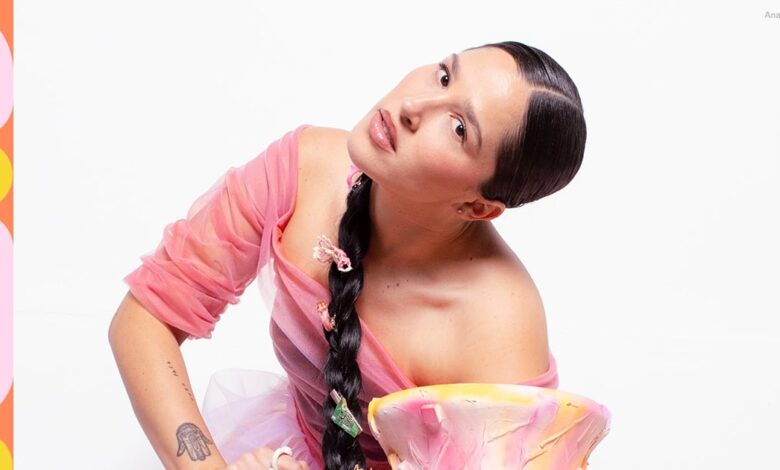Elsa y Elmar talk about mental health and new album “PALACIO”

In our Q&A/Tell Me Más special, we ask some of our favorite Latin celebrities to share some insider information about their lives and some of the ways they prioritize their mental health. This month, we spoke with rising Colombian star Elsa y Elmar about dealing with burnout, protecting her mental health, and how it all impacted the creation of her latest album, “PALACIO.”
Elsa Margarita Carvajal is no stranger to success. Better known by her stage name Elsa y Elmar, the Latin Grammy-nominated singer has been making waves in the music scene for more than a decade. But with her latest album, “PALACIO,” out August 30 and on the brink of hitting the road for her biggest tour yet, Carvajal is poised to reach new heights. Getting to that level used to mean spending years on the indie circuit, playing solo in bars trying to connect with people who had never heard of her. And while her days as an unknown indie artist are behind her, the singer admits that the pressure is still there. Carvajal says that pressure can be both good and bad. On the one hand, it can push artists to achieve bigger and better things, reaching heights that their idols have reached before.
But on the other hand, the constant pressure to strive for more and compare yourself to your peers or those who have come before you can be detrimental to your mental health. The singer says she sometimes finds herself constantly working, thinking about what she could have done. This led her to take a much-needed break to recharge after her last album, “Ya No Somos Los Mismos.” However, over the past two years, the singer-songwriter has learned valuable lessons about self-care, understanding when she needs to “turn on” and when she needs to take time for herself. From this mindset and two years without a label or A&R asking her to make new music or what she’s going to do next, Carvajal was able to overcome her burnout with her new record, “PALACIO.” The album is the first to be released on her new label, Elmar Presenta, and addresses many of the challenges many of us face on a daily basis. In a recent interview, she sat down with PS to talk about mental health and creative pressure and delved into some of the emotions behind the project.
PS: You’re about to perform at your biggest venue ever. How does it feel to reach this stage in your career?
Elsa y Elmar: You know, it’s really interesting because everything is against me. I’m not from the generation of pop women like Belenova, Julieta Venegasand Natalia Lafourcade. And I’m not an urban artist either. I’m an artist that from day one, people I work with will say, “I don’t know where you fit in. I don’t know how to explain it.” [your sound]whether you are an indie or alternative style person.”
PS: What are some things that might surprise people about the realities of being a professional musician?
Elsa y Elmar: It requires both physical and mental strength and a lot of patience… I feel like I’m always on the go.
PS: How have you learned to balance the pressure to be creative with the need to stop and take care of yourself?
Elsa y Elmar: I try to make the most of the times when I feel most creative and create as many ideas, songs and videos as possible because I know that at any given time, there will be a dry spell. But I also try to make the most of those times when I don’t feel creative, and not stress, trusting that the creativity will come back.
PS: What were some of the reasons you had to take a two-year hiatus?
Elsa y Elmar: I was fed up with bureaucracy, with expectations, with working with big firms, with just chasing carrots. I decided that if I was going to chase any carrot, it would be my carrot.
PS: This album is full of songs that deal with real issues. But perhaps the song that has gotten the most attention so far is “Entre Las Piernas,” a song that celebrates menstruation. What inspired you to tackle a topic that is still considered taboo for some?
Elsa y Elmar: To be honest, this topic didn’t really come to my mind as a song, until one day I suddenly realized that half of the world’s population loses blood once a month. And even today, in 2024, it’s still a taboo subject, it still makes people sick, and we’re not allowed to talk about it… and I just thought “thousands of love songs have been written and no one has written about this very common subject?”
PS: In another highlight of the album, you apply incredible sensitivity to the “little heartache” of being ignored in the song “Visto”—a uniquely digital issue that the singer tries to make feel timeless. Why do you think something as simple as being ignored via text message can be so painful?
Elsa y Elmar: I mean, obviously there are legitimate reasons why people get left behind when they read… but what I’m trying to say in the song is when you’re vulnerable with someone and they get left behind when you read, and it’s horrible, not understanding why the other side of the conversation, instead of communicating what they feel, just shuts down the communication and leaves you with a ton of questions and self-doubt.
PS: Finally, for those who might be going through what you’ve been going through over the past two years—heartbreak, creative pressure, being left to read—what advice can you give them about how you keep yourself sane?
Elsa and Elmar: I overheard a little conversation the other day and [heard something] That strikes me as beautiful. If a problem has a solution, then it’s no problem. And if it doesn’t have a solution, then it’s no problem either.
Whether it’s interviews or her work, Carvajal’s vulnerability is easily revealed. Yet she also understands that for many of us, vulnerability is a challenge in this modern age. But if she’s learned anything over the past two years, it’s that in order to make space for love, work, or anything else, we must first make space for ourselves, make space for ourselves in our “PALACIO.”
“PALACIO” will be released on August 30.
Miguel Machado is a journalist with expertise in the intersection of Latino identity and culture. He does everything from exclusive interviews with Latino music artists to opinion pieces on community-related issues, personal essays tied to his Latinidad, and in-depth articles and features related to Puerto Rico and Puerto Rican culture.




